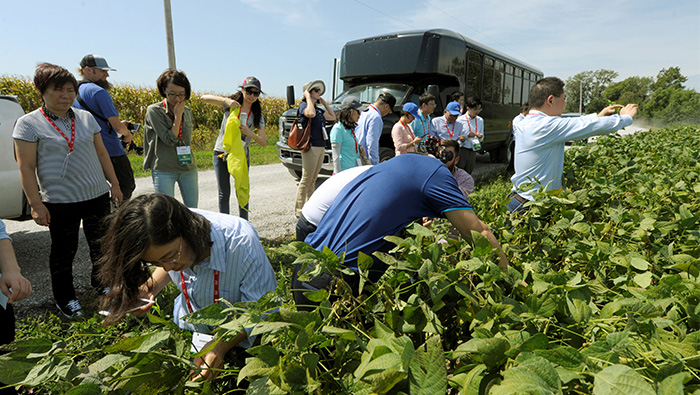
Norborne: A delegation of Chinese soybean importers toured a Missouri farm on Tuesday, climbing one-by-one into the cab of a John Deere combine before loading into a bus for a quick drive to a nearby soybean field to eye nearly ripe soy plants.
Shadowed by U.S. soybean industry representatives at the Kaiser family farm just east of the tiny town of Norborne, the two sides worked to maintain relations built over nearly four decades even though China's retaliatory tariffs on U.S. soybeans have effectively halted bilateral trade of the commodity.
The delegation, which includes many of China's top soybean processors including COFCO and Yihai Kerry, as well as Chinese representatives of U.S. companies Cargill Inc and Bunge Ltd, is meeting with U.S. farmers, industry representatives and traders this week at the U.S. Soybean Export Council's (USSEC) annual Global Trade Exchange conference.
But despite the farm tour and scheduled meetings with soy suppliers, the annual gathering is lacking a key element this year. Organisers said that unlike previous years the China delegation will not be signing billions of dollars' worth of purchase agreements. There will be no elaborate ceremony that is normally a highlight of the event, as a tariff war between the United States and China has escalated between the long-time trading partners.
Soybeans are the greatest agricultural casualty of the trade war so far between the world's two largest economies.
Top importer China bought more than $12 billion in U.S. soybeans last year, about 60 per cent of U.S. soybean exports, but has been mostly out of the market since Beijing imposed a 25 per cent tariff on all U.S. shipments on July 6 in retaliation for U.S. tariffs on Chinese goods.
But the U.S. industry is not willing to walk away from hard-won business, after investing between $120 million and $130 million in Chinese market development over the past 36 years.
"We made a conscious decision not to suspend our programmes in China so we are continuing to operate our promotional and educational programmes there. Part of that is bringing a delegation here," Jim Sutter, USSEC's chief executive officer, said in an interview at the Kaiser family farm on Tuesday.
U.S. soybean prices have tumbled about 18 per cent over the past three months as the threat of tariffs shifted Chinese buyers to book soybeans almost exclusively from Brazil, the top exporter of the oilseed.
The industries in the United States and China have hosted purchase-agreement signing events up to three times a year in recent years, but have not done so since a ceremony last November in Beijing, said Xiaoping Zhang, USSEC's director for China.
An event in July 2017 in the United States resulted in 12.5 million tonnes in purchase agreements, the second-largest one-off deal for U.S. soybeans ever.
Even small deals for U.S. soybeans to China may be elusive during this week's gathering.
"This week it will be very difficult to finalise any business, but we can talk the market and exchange views on the market," said a Chinese buyer for a top-five crusher in the country. "Maybe in the near future we can finalise the business."
"We can cover our demand until November. But for December and January, we are a little short of beans," he said, declining to be identified by name. China's total U.S. purchases in December and January should total at least 13 million tonnes, he said.
After the conference in Kansas City, Missouri, the delegation will travel to the U.S. East Coast to tour the port of Norfolk, Virginia, operated by Perdue AgriBusiness.
Another delegation member from a top-ten crusher in China said he is unsure of how long the trade war will drag on but that Chinese buyers will return to the U.S. market as Brazilian supplies run low and prices there rise in response.
That, said the soy buyer, may already be starting to happen.
"Since last Friday, the (South American) sales basis is starting to rally by around 20 cents per bushel. That means commercial stocks are getting tighter," said the trader, who also declined to be identified.
Still, the two sides remained locked in the standoff.
"We clearly have differences. We want to come to terms with China, terms that are fair and reciprocal," Ken Isley, administrator of the U.S. Agriculture Department's Foreign Agricultural Service, told conference attendees on Wednesday.
"Stay tuned. I'm optimistic. It may take a while," he said.
The USSEC's chief executive, Sutter, said the announcement of a preliminary U.S. trade deal with Mexico this week gave him confidence that U.S. President Donald Trump's sometimes aggressive approach to trade negotiations may ultimately yield results with China.
"When the trade war is concluded, we want to be able to jump right back in and be doing business again."